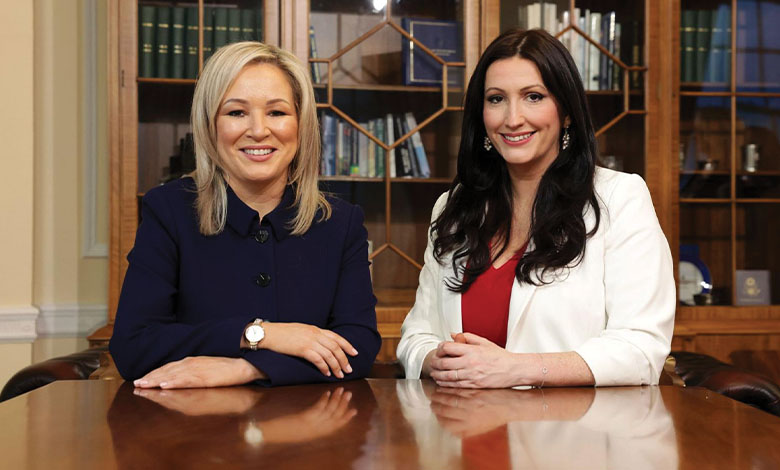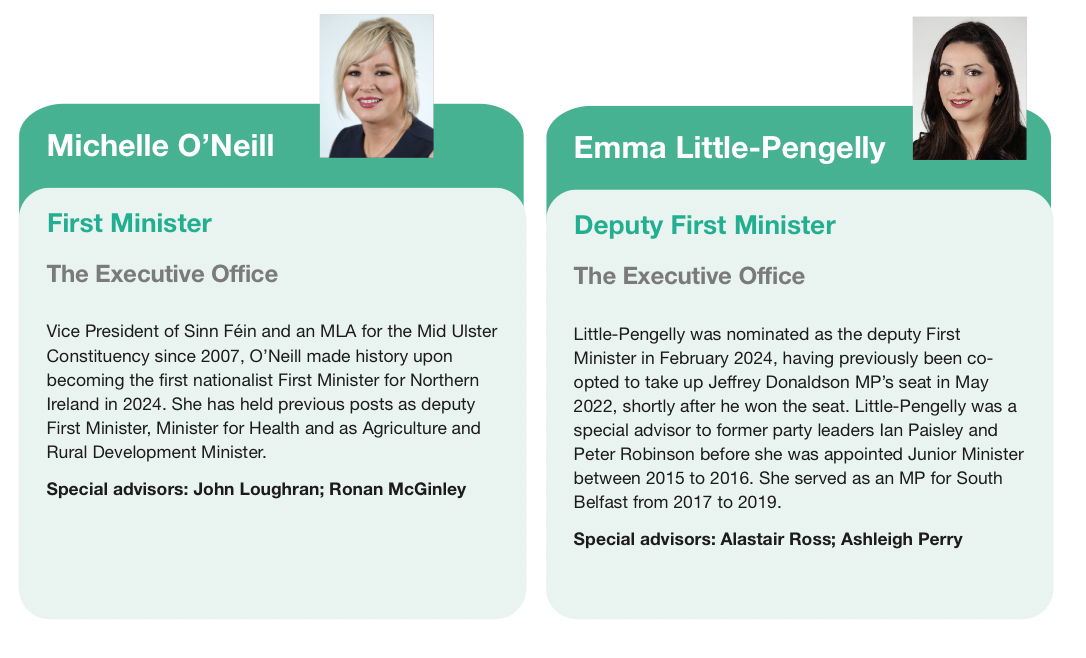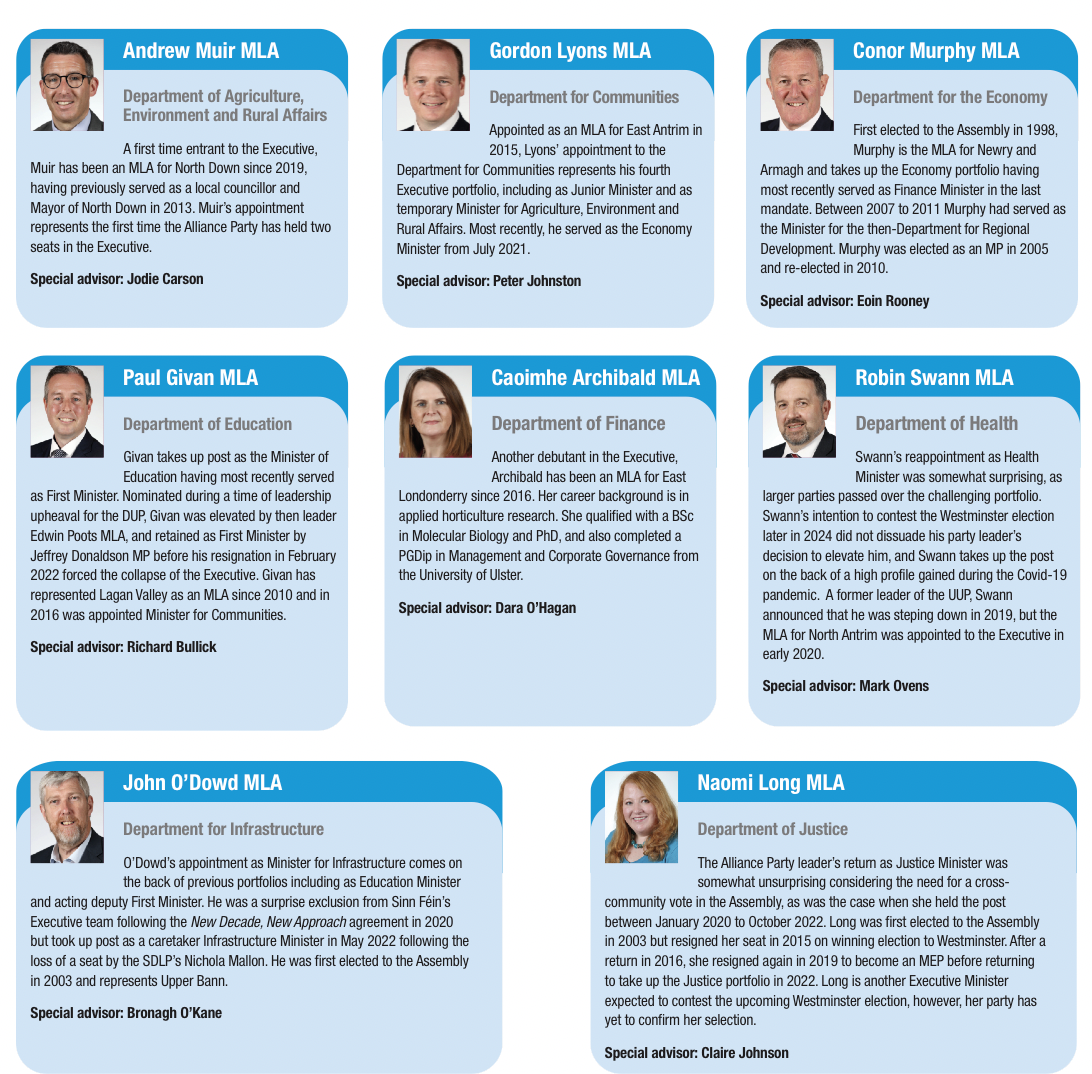Stormont resilience to be tested

While the Stormont institutions have navigated the early months with some success, the inevitable fragility of power-sharing is set to be tested by both predictable and unpredictable challenges, and by the demand for delivery.
Following a two-year absence, the return of power-sharing in Northern Ireland was always going to endure a period of sustained turbulence but no one could have predicted the levels of upheaval caused by the arrest of Jeffrey Donaldson MP and his subsequent resignation from the DUP. Undoubtedly, Donaldson’s arrest will have ramifications for the DUP and the Executive. Charged with historical sexual offences, the party has said that all political links with Donaldson have been cut.
However, he remains an independent MP for Lagan Valley. Whether he will resign that seat remains to be seen, but interim DUP leader Gavin Robinson MP has already stated that the party is searching for a candidate to contest the next Westminster election.
One of the potential frontrunners will be sitting Lagan Valley MLA and Education Minister Paul Givan. Givan’s name has not been formally touted by the party, potentially because of the instability it could cause. Robinson himself will be vying to hold his Westminster seat in the coming months and the addition of a sitting Executive minister to the ballot, alongside questions already being posed about the legitimacy of an unelected deputy First Minister, could be a step too far in the balance of stability.
To some degree, Donaldson’s sudden departure has relieved some of the mounting pressure on the new Executive for delivery beyond rhetoric, but a unified touting of ‘business as usual’ from Executive partners, means that questions will be asked of what progress has been made since the decision to re-enter Stormont was taken.
Even prior to Donaldson’s departure, the looming Westminster election posed challenges for the new Executive. Although not yet formally confirmed by their party, both the UUP’s Health Minister Robin Swann MLA and Alliance Party Leader and Justice Minister Naomi Long MLA are expected to contest for seats.
Political opponents will question whether individuals can balance ministerial portfolios with canvassing for an entirely different role. With over two years of the current mandate lost to suspension, any further departmental disruption during the remainder of the mandate would be an unwelcome development.
Budget
The new-look Executive, led by a nationalist First Minister for the first time, also faces a new look challenge in the form of a pioneering Official Opposition. Whether the SDLP, with only seven MLAs – minus Justin McNulty MLA – will have the critical mass to be effective remains to be seen. However, their potential impact can be best assessed in the context of early efforts on behalf of ‘the big two’ to undermine the opposition.
Neither the First Minister nor the deputy First Minister were in the chamber to respond to calls to reform the institutions to prevent further collapses, which earned a rebuke from the Assembly speaker Edwin Poots MLA.
However, a look at the impact the UUP and SDLP made as an opposition partnership during a short lifespan in 2016 on bringing the RHI scandal into the public eye, is evidence of how opposition can scrutinise a sitting Executive.
The SDLP set out its stall on its intentions to enter opposition over two years ago, claiming at the time that its role would be “constructive”, as opposed to ‘sniping from the sidelines’, an accusation often levelled at those outside of government in other legislatures.
They have landed some early blows. Opposition Leader Matthew O’Toole MLA accused the Executive partners of announcing several specific policy commitments through Assembly motions while failing to publish a Programme for Government (PfG).
“These indicative motions, however, have no binding effect and ministers have, to date, tabled no legislation to give effect to any of the proposals,” he stated.
Calls for the publication of a Programme for Government are pointed, not only because of the shortened mandate, but also because in the absence of a functioning Executive, the four main Executive parties and the Head of the Civil Service, Jayne Brady, continued to meet around PfG formation.
Similarly, on gaining acknowledgment from the Speaker that “the proper procedural approach” was not being followed by some ministers with regard to providing information to written and oral questions, O’Toole’s party colleague Mark Durkan MLA said: “We’re in the absurd position at the moment where ministers are tripping over themselves to claim good news stories but refusing to front up to tough questions about the stark positions that many people find themselves in. They can’t have it both ways.”
Criticism has centred on a lack of concrete legislative progress in areas, which prior to the Executive and Assembly’s return were heralded as urgent priorities. Most prominently, is the necessity of sustainable public finances and an envisaged multiyear budget.
Additional finances attached to the return deal were welcomed, and helped initial pressures around demands for pay increases, however, the long-term sustainability of these finances has been raised as a challenge, as too have the attached strings of the deal, including the need for Stormont to introduce additional revenue-raising measures.
Hopes that a new budget could be in place by the turn of the new financial year in April 2024 were optimistic and it now appears that the Executive has settled on using the cover of the current Secretary of State’s annual budget as cover to undertake negotiations. Given the number of priorities to be balanced, those negotiations are unlikely to run smoothly.
A further caveat is the requirement for a further Westminster capital injection into any multi-year budget planning. With the UK Government’s Spring Budget already published on 6 March 2024, the forthcoming election could pose a challenge to securing long-term commitments needed to deliver an Executive budget at pace.
The stability of the current Executive will be determined by its ability to effectively overcome not only ad-hoc challenges, but also those long-standing problems which have yet to be addressed. Reducing waiting lists amidst a growing health crisis, increasing housing supply amidst growing levels of housing stress, and funding the necessary infrastructure for economic growth, such as water and waste water, are just some of the challenges to be tackled.
Overshadowing these challenges is the climate and biodiversity crisis, brought into sharp relief by recent severe weather patterns and the ecological disaster at Lough Neagh. The Climate Change Act (Northern Ireland) 2022 mandated the progression of Northern Ireland’s Climate Change Act. More pointedly, also forthcoming is the need to publish and implement carbon budgets. While the established GHG emissions targets are a net figure for Northern Ireland, each department will have to ensure that total emissions for each budgetary period do not exceed the carbon budget for that period.
As seen in other legislatures, the need for investment and carbon emission reductions in separate departments in the strive towards net zero can make for testing conversations at Executive level.
The Stormont Executive has a remaining mandate of around three years to not only make up for lost time, but set the waypoint for key economic sectors. Given the scale of the challenge, greater resilience will be needed than has previously been exhibited.
A new look Executive

Junior ministers

Executive ministers






